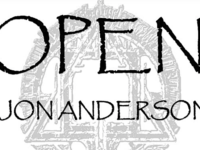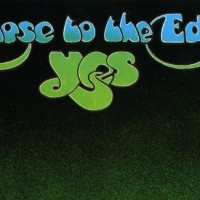When The Grand Scheme of Things arrived on August 24, 1993, Steve Howe had seen his share of outsized chart success as a member of Asia. He was ready, it seemed, to return to the more philosophical explorations that had marked his earlier time in Yes, something hinted at by his then-recent collaborations with a trio of his former bandmates in Anderson Bruford Wakeman Howe.
It’s a dextrous, and often sadly overlooked, project — and not just because it finds Howe playing an array of instruments beyond his reliably intriguing guitar, from dobro to keyboards to mandolin to organ. Howe continued to improve as a singer of quiet intimacy across seven vocal tracks, even as he helped redraw perceptions [in particular on the superlative “At the Gates of the New World”] about his underrated role in Yes — not just as an instrumentalist, but also as a lyricist.
Even today, he’s taken aback by such non-guitar-related praise. “I’ve got to tell you, I’m getting chills up my spine — I don’t hear this a lot,” Howe relates in an exclusive Something Else! Sitdown. “I’m not an egotist, and I’m not going to get on people’s case, saying ‘You know, I invented this stuff.’ But once we got to [1972’s] Close to the Edge, that had many of my lyrics on it. I don’t want to take anything away from Jon Anderson, because we became a good team — from “Awaken” [for 1977’s Going for the One] on through to [the 1996-97] Keys to Ascension [combination live/studio albums]. There were a lot of lyrical collaborations on [1973’s Tales from] Topographic [Oceans], too.”
An album of clear-eyed optimism that at the same time didn’t shy away from big ideas, The Grand Scheme of Things made the argument in ways Howe never could. After a lengthy period of avoiding conversations about his narrative contributions to Yes’ most celebrated period, Howe suddenly made that legacy quite clear with this project. In retrospect, he probably should have been talking about it all along, but as Yes — and prog, in general — fell out of favor, Howe simply moved on to other more comfortable environs, namely the top of the pop charts with Asia.
“In a way,” he tells us, “I was ducking. It got to the mid-1970s, and people were trying to slag us off and say: ‘You can’t understand what these words are about.’ Of course, mine weren’t so vague. I did write the lyric: ‘close to the edge, down by the river’; I also wrote the ‘in her white lace’ section. I didn’t rush to try to get more credit because, after all, it says on there: ‘Anderson/Howe.’ That was pretty much good enough for me. But then came this criticism, and they didn’t like certain kinds of lyrics.”
Listen intently to The Grand Scheme of Things, and Howe’s ghostly presence in some of Yes’ more memorable musical statements becomes ever more defined. The sense that Anderson was the only one living the life of the imagination falls away quickly — even if Howe’s way with a lyric differs in important ways.
“Mine were always clearer, and more common place, than Jon’s,” adds Howe, who is preparing for a UK tour in September. “Jon sometimes — and I liked it — would dream up stuff to go around it. It was much more interpretive, in a broader and vaguer sense, whereas mine were quite personal. Certainly, with ‘Close to the Edge,’ I was living in Battersea and I could see the River Thames. My first reason for writing it was because I was actually living by a river, and I was very close to the edge! [Laughs.] But Jon, brilliantly, took that and just went with it.”
The Grand Scheme of Things, which rose to No. 15 on the Billboard new age charts, is rounded out by nine involving instrumentals — including “The Valley of Rocks,” a chipper sequel to “The Clap” from 1971’s The Yes Album. Roger Dean, who worked with both Yes and Asia, provided the cover art.
But the larger sense of homecoming surrounding this release goes beyond its obvious connections to Yes. Howe collaborates with Keith West, a member of his pre-Yes band Tomorrow. Howe also took the opportunity for the first time to work with two of his children on The Grand Scheme of Things, keyboardist Virgil and drummer Dylan. Bassist Nick Beggs would later collaborate with Howe’s former GTR bandmate Steve Hackett.
- Nick DeRiso’s Best of 2015 (Rock + Pop): Death Cab for Cutie, Joe Jackson, Toto + Others - January 18, 2016
- Nick DeRiso’s Best of 2015 (Blues, Jazz + R&B): Boz Scaggs, Gavin Harrison, Alabama Shakes - January 10, 2016
- Nick DeRiso’s Best of 2015 (Reissues + Live): John Oates, Led Zeppelin, Yes, Faces + others - January 7, 2016




Very solid album – always enjoyed it. Most will not like the vocals, but there’s some very good songs on here and the material would have been ripe for the picking to make a great follow-up to ABWH.
as a follow up to Turbulence, i was disappointed with the “Scheme” album. don’t get me wrong, the guitars were brilliant as always, but i just didn’t enjoy Steve’s lead vocals. i still love Steve Howe, he is still on my short list of greatest Guitar players ever. but this is one album that has got very little air time in my house.
Is it worth a listen…. say on a long drive?
ofc, if you have never heard it b4 then you should give it a go. just because it was not my cup of tea, doesn’t mean you won’t enjoy.
I bought and liked both “Turbulence” and “Scheme”. However, I found Scheme to be more original and inspired. (While solid and inspirational, there are some re-worked or recycled melodies and structures from “Union” on “Turbulence”) Also, on Howe’s singing, it is bad, and I like it. As part of the unique 3 part harmony of YES it fits perfectly, but by itself there is a flatness an off tonality. However, it identifies the song as unmistakably Howe. Some singers voices, while not virtuoso or even “good” become trademark (Jimi Hendrix, Joe Cocker and more). I prefer the albums where he sings. It makes me feel like I’m getting more of what I got with “Beginnings”.
Really? If you’ve heard any of Howe’s ‘Mothballs’ albums it’s pretty clear that he was responsible for a huge amount of the songwriting [including the basis of many of the lyrics] on the classic material. I do think Anderson’s more tangential approach adapting those lyrics improved them and I also think Mr A was the brain behind the blending of themes into longer forms. But the pair are in my opinion, whilst in their own way possessing some part of musical genius, much stronger as a pair in true collaboration.
I actually think the way Howe refers back to the collaborative days is quite honest and generous – I wish Anderson could share that same spirit, but alas it seems he struggles to find that greater spirit in spite of his philosophical bent.
Ok…. gave it a listen… Pure Howe, essential Howe indeed….However, Mr. A’s absence looms as loud an open Chord , say in the key of “C”
‘Desire Comes First’ – an instrumental is one of my favourite Steve solo tracks. That’s mainly for the closing duet with violinist, Anna Palm who contributes a superbly lyrical solo passage to compliment Howe’s soaring guitar.
I too actually like SH’s ‘bad’ singing. Yes technically he isn’t great, but there’s musicality and level of interpretation that lifts his solo singing beyond that of his slightly more tuneful bandmate Chris Squire IMO. Interesting that he’s a fan of Bob Dylan – another bad voice that is nontheless interesting and therefore listenable.